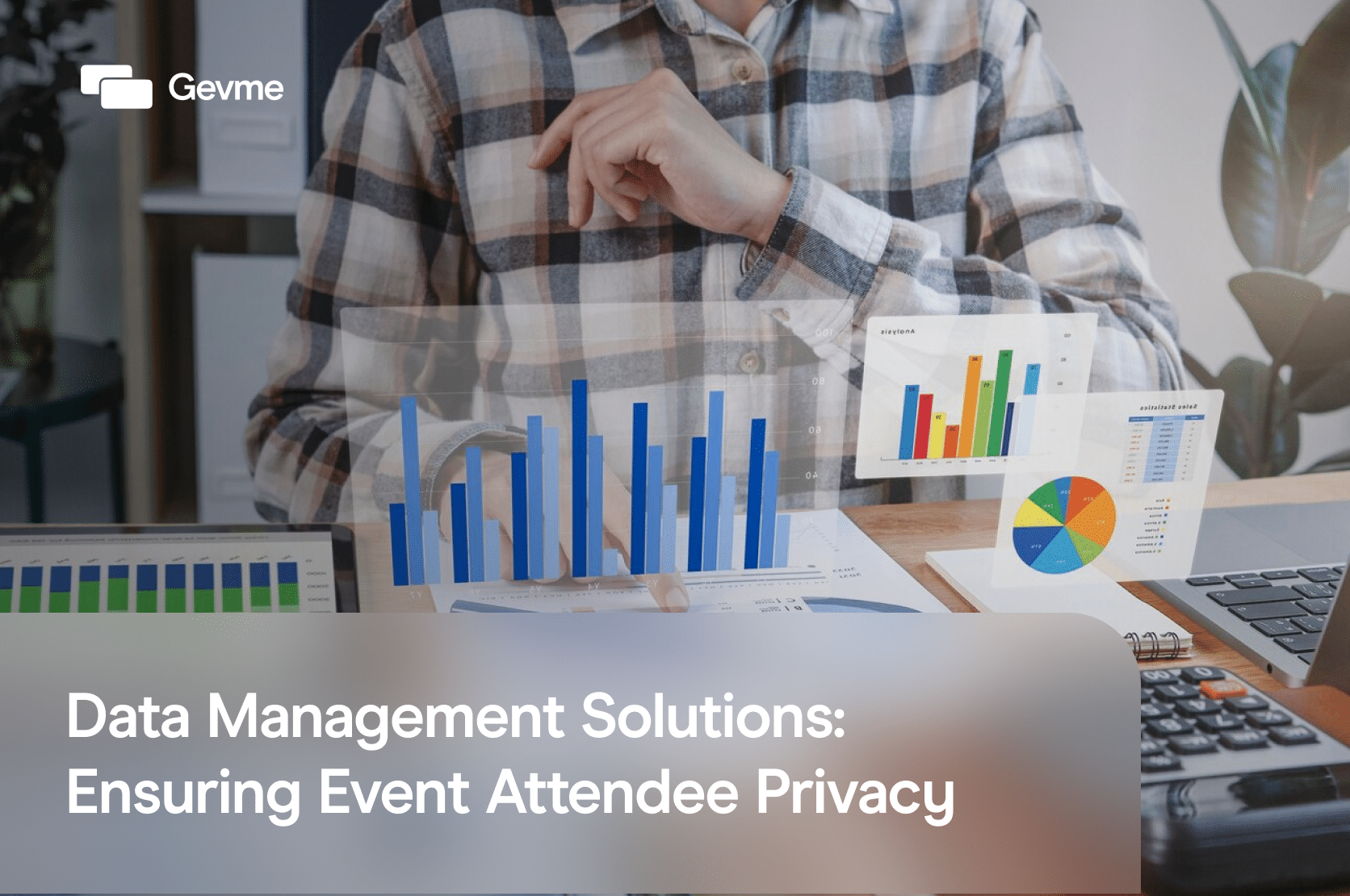In the dynamic landscape of event management, data analytics has emerged as an invaluable tool for organisers. From gauging attendee engagement to optimising event content, data-driven insights have become indispensable in crafting successful events. However, this reliance on data analytics has brought forth a critical concern—attendee data privacy.
As event organisers gather vast amounts of data, including attendee information and behaviour, ensuring the privacy of this data has become a top priority. In an era where data breaches and privacy violations make headlines, event professionals are acutely aware of the need to safeguard attendee data.
This blog delves into the pivotal role of data management solutions in preserving event attendees’ privacy and the evolving landscape of data analytics in events.

I. The Evolving Landscape of Data Analytics in Events
A. The Role of Data Analytics in Event Planning and Execution
Data analytics has transformed the way events are planned and executed. Event organizers now have access to a treasure trove of insights that enable them to make informed decisions at every stage of event management. From understanding attendee preferences to optimising event content, data-driven strategies have become the backbone of successful events.
B. The Types of Data Collected During Events
Events generate a plethora of data points. Registration details, session attendance, engagement with event materials, and post-event surveys—all contribute to a comprehensive dataset. This data helps organisers better understand attendee behaviour, allowing for personalised event experiences.
C. The Benefits of Data Analytics for Event Organizers
The advantages of data analytics in events are manifold. Organisers can identify trends, measure the success of specific sessions or activities, and even predict attendee behaviour. This valuable information enables them to make real-time adjustments, enhance engagement, and deliver more meaningful event experiences.
D. The Shift Towards Data-Driven Decision-Making
Event professionals are increasingly relying on data-driven decision-making. It’s no longer about gut feelings or intuition alone; organisers are turning to data to guide their choices, ensuring that every aspect of the event is fine-tuned for maximum impact.

II. The Privacy Imperative in Event Attendee Data
A. The Importance of Protecting Attendee Data
With the abundance of data collected during events, protecting attendee data is paramount. Attendees trust organisers with their personal information, and it is the ethical duty of event professionals to safeguard that trust. A breach in data privacy can not only harm attendees but also tarnish an event’s reputation.
B. The Regulatory Landscape and Its Impact on Events
The introduction of stringent data protection regulations, such as the General Data Protection Regulation (GDPR) in Europe and the California Consumer Privacy Act (CCPA) in the United States, has cast a spotlight on data privacy. These regulations have far-reaching implications for event organisers, necessitating compliance in the handling of attendee data.
C. The Potential Consequences of Data Breaches and Privacy Violations
The fallout from data breaches and privacy violations can be severe. Apart from financial repercussions, event organisers may face legal consequences and reputational damage. The cost of recovering from such incidents can far exceed the investment in robust data management solutions.

III. Challenges in Ensuring Data Privacy in Event Analytics
A. The Complexities of Managing and Protecting Event Data
Managing the vast and diverse dataset generated by events is no small feat. Organisers must grapple with the challenges of collecting, storing, and securing data, all while respecting attendee privacy. The intricacies of data management require dedicated solutions.
B. Balancing Data-Driven Insights with Privacy Concerns
A delicate balance must be struck between extracting valuable insights from event data and preserving attendee privacy. Straying too far in either direction can be detrimental. Event professionals need tools and strategies that allow them to harness data for improvement while safeguarding attendee information.
C. The Need for Clear Data Handling Policies and Consent Mechanisms
Clarity is key to data privacy. Event organisers must establish transparent data handling policies that attendees can easily understand and consent to. Effective consent mechanisms should provide attendees with choices regarding the use of their data, enhancing trust and compliance.
IV. The Role of Data Management Solutions
A. Introduction to Data Management Solutions
Data management solutions are the linchpin in the pursuit of event attendee data privacy. These solutions encompass a suite of tools, technologies, and practices designed to handle data throughout its lifecycle. They provide event organisers with the means to collect, store, process, and protect data, all while adhering to stringent privacy regulations.
B. How Data Management Solutions Enhance Data Privacy
At their core, data management solutions are engineered to enhance data privacy. They provide robust security features to protect data from unauthorized access, breaches, or leaks. Encryption, access controls, and secure data storage are some of the mechanisms that bolster data security.
Additionally, these solutions facilitate compliance with data protection regulations by enabling organisers to establish clear data handling policies and consent mechanisms. They ensure that attendee data is used for its intended purpose and provide mechanisms for attendees to exercise control over their information.
C. Key Features and Functionalities of Effective Data Management Solutions
Effective data management solutions come equipped with a range of features and functionalities tailored to the unique demands of the event industry. These include:
- Data Encryption: The encryption of data both at rest and in transit ensures that even if unauthorized access occurs, the data remains unreadable.
- Access Controls: Organizers can define who has access to specific data, limiting it to authorized personnel only.
- Secure Storage: Data is stored in secure environments, protected from physical and digital threats.
- Consent Management: Attendees can provide informed consent regarding the use of their data, with options for granular control.
- Data Masking: Sensitive information can be masked or anonymized, reducing the risk associated with data exposure.
- Data Retention Policies: Organizers can establish data retention periods, ensuring that data is not retained longer than necessary.
- Audit Trails: Detailed logs and audit trails enable event professionals to track data usage and access.
V. Implementing Data Management Solutions in Event Planning
A. Steps to Integrate Data Management Solutions into Event Planning
Integrating data management solutions into event planning involves a structured approach:
- Assessment: Evaluate the types of data your event collects and the systems that handle it.
- Selection: Choose data management solutions that align with your event’s needs, considering factors such as scalability and compliance.
- Implementation: Configure and deploy the chosen solutions within your event infrastructure.
- Policy Creation: Develop clear data handling policies and consent mechanisms, ensuring alignment with privacy regulations.
- Training: Provide training to event staff and partners on data privacy best practices.

B. Ensuring Compliance with Data Privacy Regulations
Compliance with data privacy regulations is non-negotiable. Event organisers must familiarize themselves with the relevant laws, such as GDPR, CCPA, and others applicable in their region. Data management solutions should be configured to enforce compliance, with mechanisms for obtaining and recording attendee consent.
C. Creating a Transparent Data Handling Policy for Attendees
Transparency is key to earning attendee trust. Event organizers should create and communicate a clear data handling policy that informs attendees about the data collected, its intended use, and the steps taken to protect it. Attendees should be allowed to provide informed consent and exercise control over their data.
VI. Best Practices for Event Data Privacy
A. Tips for Event Organizers to Ensure Data Privacy in Analytics
Event organisers can take several steps to ensure data privacy in event analytics:
- Education: Train event staff and partners on data privacy best practices and regulations.
- Consent Mechanisms: Implement clear and user-friendly consent mechanisms for data collection and usage.
- Data Minimization: Collect only the data necessary for event objectives, minimizing the risk associated with unnecessary information.
- Regular Audits: Conduct regular audits of data management processes to identify and rectify potential vulnerabilities.
- Transparency: Be transparent with attendees about data collection and usage, building trust through open communication.
- Response Plans: Develop incident response plans to address data breaches swiftly and effectively.
B. Strategies for Fostering Trust with Event Attendees
Building trust with event attendees is foundational to data privacy. Strategies for fostering trust include:
- Clear Policies: Create and communicate clear data handling policies.
- Communication: Keep attendees informed about data usage and privacy measures.
- Transparency: Be transparent about how attendee data is processed and secured.
- Empowerment: Provide attendees with choices and control over their data.
C. Continuous Monitoring and Improvement of Data Privacy Measures
Maintaining data privacy in event analytics requires a continuous commitment to regular audits, Data Protection Impact Assessments (DPIAs), security updates, ongoing privacy training, feedback collection, incident response planning, policy reviews, and transparent communication with attendees. These proactive steps enable event organizers to adapt to evolving privacy landscapes, protect attendee data, and build and maintain trust within their event community.
VII. The Future of Data Privacy in Event Analytics
A. Evolving Privacy Regulations
Data privacy regulations are not static; they continually evolve to address emerging challenges. Event organisers must stay abreast of these changes to ensure ongoing compliance. Future regulations may impose even stricter requirements, underscoring the importance of robust data management solutions.
B. Technological Advancements
The advancement of technology will play a pivotal role in shaping the future of data privacy in event analytics. Innovations in encryption, data anonymization, and secure data sharing will provide event organizers with even more powerful tools to protect attendee data while deriving valuable insights.
C. Enhanced Data Consent Mechanisms
Attendee consent mechanisms will become more sophisticated and user-friendly. Organizers will implement solutions that allow attendees to provide consent for specific data uses, enhancing transparency and control.
VIII. The Enduring Importance of Data Privacy
In the digital age of events, data privacy holds a pivotal role that extends beyond mere legal compliance. It’s a core element that fosters trust among attendees, ensures compliance with evolving regulations, enables personalised attendee engagement, and reflects ethical responsibility. Building trust through data privacy is crucial for long-term event success, as attendees who feel secure about their data are more likely to engage, return, and advocate for events. As events continue to evolve, prioritizing data privacy remains essential for organisers striving to excel in the realm of data-driven, privacy-compliant events.
IX. Gevme: Your Partner in Data-Driven, Privacy-Compliant Events
In the pursuit of data privacy in event analytics, having the right partner can make all the difference. Gevme, a leading player in the field of event management, offers an innovative and comprehensive platform that includes robust data management solutions.
Gevme’s suite of tools and technologies empowers event organizers to collect, process, and protect attendee data while adhering to stringent privacy regulations. With Gevme, you can establish clear data handling policies, implement consent mechanisms, and ensure transparency, all within a user-friendly interface.
Moreover, Gevme is committed to staying ahead of evolving privacy regulations and technological advancements, providing you with the assurance that your events remain privacy-compliant in the ever-changing landscape of data analytics.
Conclusion
In the digital age of events, data analytics is a formidable ally for event organisers. However, with great data comes great responsibility. Ensuring attendee data privacy is not only a legal requirement but also an ethical imperative.
As we’ve explored in this comprehensive guide, data management solutions are the linchpin in achieving data privacy in event analytics. From safeguarding attendee information to complying with regulations, these solutions provide the necessary framework.
The future of data privacy in event analytics promises to be both challenging and rewarding. With evolving regulations, technological advancements, and enhanced consent mechanisms, event organizers have the opportunity to strengthen their commitment to data privacy.
It’s time to embrace the future of event management—one where data privacy is at the forefront.








